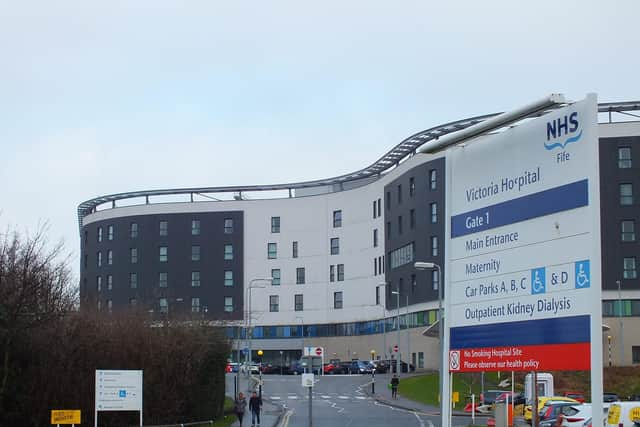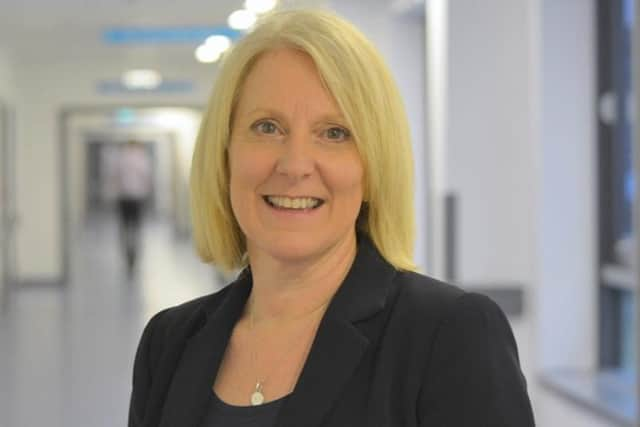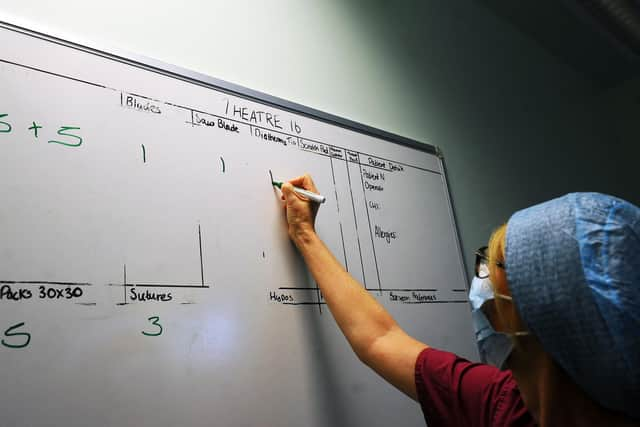NHS Fife warns of ‘relentless’ pressure as it faces ‘most challenging’ winter ever
and live on Freeview channel 276
Carol Potter, who took up her role just as the COVID pandemic began in January 2020, said the whole health and care system had been under “exceptional and relentless” pressure for the past 20 months, with that unlikely to show any sign of letting up over the next four to six months at least.
That, in turn, has led to pre-pandemic targets and standards in areas such as emergency access, delayed discharges and waiting times not being met, while staff are reporting feeling exhausted and working in an environment of increasing demand, sickness absence and, despite best efforts to recruit, high vacancy levels.
Advertisement
Hide AdAdvertisement
Hide AdThe grim picture has been painted in an update to NHS Fife’s board this week, although board members have been assured that all necessary actions to minimise risk to patients and staff were being taken as far as possible.


“We do not underestimate the extent to which the pressure could have a detrimental impact on patients and staff,” Ms Potter commented.
“Many of the issues are not new – the health and care system was under pressure before the pandemic – however, the situation has been exacerbated by COVID-19.
“The unprecedented challenges currently facing NHS Fife and the Fife Health and Social Care Partnership reflect the combined issues of continuing high numbers of COVID hospital admissions, high volume of attendances within the emergency department, continuing high emergency admissions, capacity and sustainability challenges within primary care, and difficulties in the flow of patients through our system as we see similar pressures in the social care setting.


Advertisement
Hide AdAdvertisement
Hide Ad“In addition, the physical constraints of many buildings, which were never designed to enable the extent of spacing requirements to support the infection prevention and control aspects of COVID-19, present further challenges for accessibility and capacity, including primary, community and secondary care services.”
A report to the board confirmed that unscheduled attendances and admissions to hospital have increased, long waits in the emergency department have increased “dramatically” in recent months, and elective activity is becoming “increasingly difficult” to maintain - running at just 79% of pre-pandemic activity.
The stepping up of the combined flu and COVID-19 booster programme, described by Ms Potter as “arguably the most significant public health intervention in a century”, hasn’t helped either.
And she added: “This is a political and public health priority and is viewed as the key route out of the pandemic and, whilst it has been delivered and continues to be delivered successfully in Fife, it is a significant logistical exercise which has required significant movement of staff to deliver.”


Advertisement
Hide AdAdvertisement
Hide AdStaff sickness absence has risen from 5.7% in October 2019 to 6.34% in October this year, and an estimated four out of every five absentees are off long-term.
Ms Potter continued: “It is evident within the current climate that we face staff shortages across many professions; with recognised acceptable staffing ratios often being difficult to maintain.
“This increases workload and places a level of personal pressure on individual members of staff in their commitment to fulfil their role to the best of their abilities.
“NHS Fife recognises that listening to staff voices and dealing with concerns and issues in partnership is core to our ability to meet the current challenges and ensure everything possible is being done to address the difficulties being faced on a daily basis by our staff.”
Advertisement
Hide AdAdvertisement
Hide AdFigures comparing October 2019 to October 2021 show that the percentage of people being seen at the emergency department within four hours has slumped from 90.2% to 70.3%, while delayed discharges stood at 121 last month compared to 92 two years ago.
With all that in mind though, a new Operational Escalation Plan has been drawn up and will be implemented in the next 10 to 14 days in a bid to improve workforce capacity and patient flow.
“It’s about supporting decision making and having clear roles and responsibilities for staff at all levels,” Ms Potter concluded.
NHS Fife chair Tricia Marwick hailed the “whole system” approach in the plan and thanked each and every member of staff for their ongoing efforts.
Advertisement
Hide AdAdvertisement
Hide Ad“It shows that what we do in one area impacts on another and it’s important we get this whole system approach right,” she concluded.
“This is a moving feast - there’s no set point where we can say “this is it” and there will be changes to be made, so we need to be able to react when circumstances change.”
